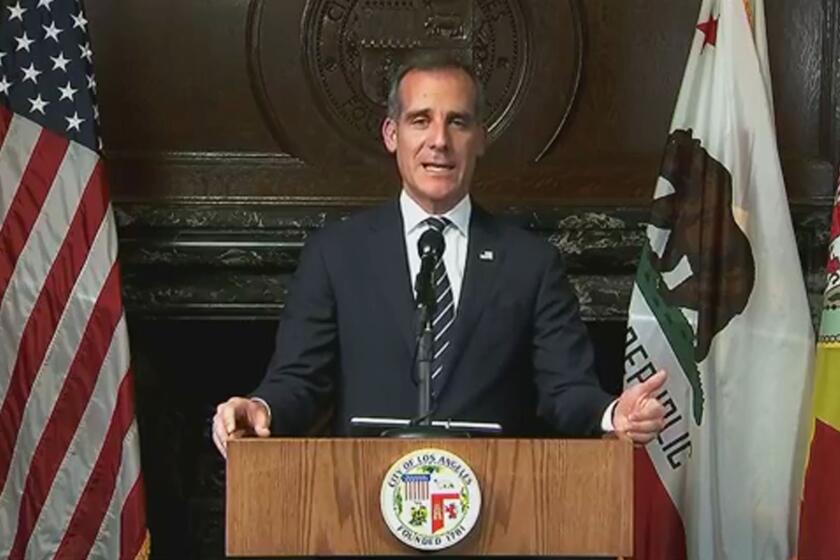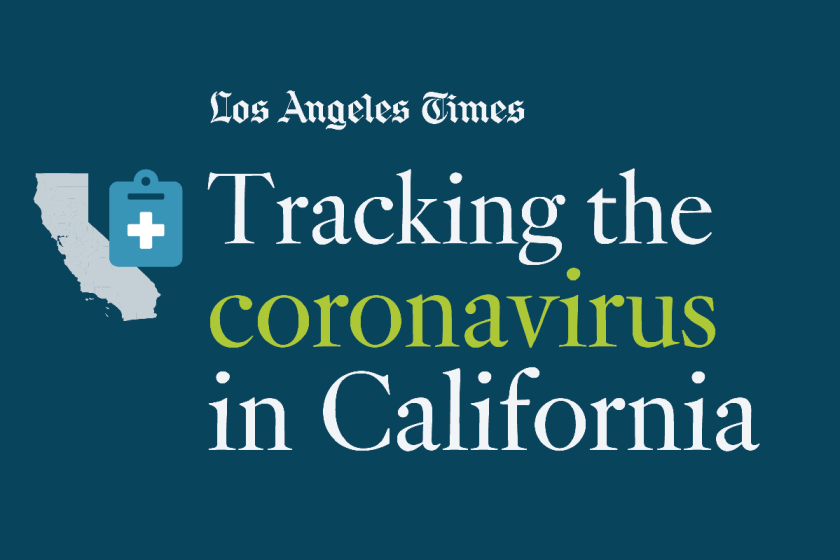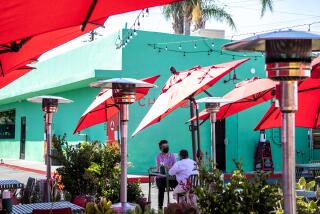L.A. bars forced to close, restaurants go takeout-only: ‘Some of these closures might be permanent’

- Share via
In an aggressive bid to slow the spread of the novel coronavirus, Mayor Eric Garcetti ordered bars to close and forced restaurants to halt dine-in service. Food and nightlife proprietors fear some establishments might not reopen.
The restrictions, announced by Garcetti in a Sunday night video news conference, went into effect at midnight and run through March 31. They also apply to movie theaters, gyms and fitness centers. Grocery stores, pharmacies and food banks will remain open.
Garcetti said the measures were necessary to protect public health but acknowledged the economic consequences they pose for small businesses.
“I encourage all Angelenos to help support these critical small businesses — the restaurants we love in our neighborhoods — by continuing to order from them or getting takeout or delivery,” Garcetti said.
In ordinary circumstances, restaurants are known for high overhead costs and relatively narrow margins. Chefs say an extended shutdown could have far-reaching consequences for the largest private-sector industry in the county, accounting for 355,540 jobs, according to a 2017 L.A. County Economic Development Corp. report.
“It’s a gut punch on a Sunday night,” said Sang Yoon, chef and owner of Lukshon and Father’s Office.
“When this is over, the L.A. restaurant landscape might look dramatically different, so that’s a huge fear,” Yoon said. “The lasting implications after this may not be temporary. Some of these closures might be permanent for a lot of places.”
Josef Centeno, 45, the chef-owner of Baco Mercat, Bar Ama and Orsa & Winston in downtown L.A. and Amacita in Culver City, preemptively transitioned all his restaurants to takeout- and delivery-only on Friday. He worries he won’t be able to sustain his businesses on such orders for long.
“We’ll be completely out of money in like a week and a half,” he said.
He has already cut his managers’ salaries in an attempt to spread the wealth among his staff of 140 and keep his restaurants going as long as possible.
“Everyone is going to be saving their money,” Centeno said. “No one is going to be ordering takeout. I’m mentally preparing to pretty much lose everything.”
Many California counties reported more cases of the coronavirus as officials urged residents to dramatically restrict their interaction.
The announcement came on the heels of a request Sunday afternoon by Gov. Gavin Newsom urging bars, nightclubs, wineries and breweries in California to shut down operations.
Around 5 p.m. Sunday, the usually bustling Tabula Rasa wine bar in Hollywood was mostly empty, with a handful of patrons finishing up their glasses.
After Newsom’s recommendation, owner Zach Negin, 40, announced last call before an extended closure. Some of the employees behind the bar had tears in their eyes.
“If I knew that in two weeks we’d be open and back to business as usual, yeah, no problem — we can afford to pay our employees. But I don’t know that we’ll be open in two weeks or six weeks,” Negin said.
“We’re not looking to be charities. We are a business and businesses deal with things that are unexpected, and this is an extreme example of that,” he said. “It might put us out of business. It will put lots of people out of business.”
Tabula Rasa manager Nicole Dougherty, 33, said she has a staff of 10 people asking her questions she doesn’t have answers to.
“Mostly I’m feeling a sense of hopelessness and the inability to provide,” she said. “Do we need to throw away all of our food? Just not knowing. We’re a tiny business. Not knowing where our income is going to come from and how we are going to take care of our staff and employees.”
In recent years, restaurants have struck deals with app-based delivery companies such as Grubhub Inc., DoorDash Inc. and Postmates Inc. But quickly shifting to a delivery-only business model isn’t easy — nor is it necessarily profitable.

Chad Colby, chef at Italian restaurant Antico on Beverly Boulevard, said his shop doesn’t have a delivery service set up. He plans to spend Monday talking to the delivery services but is hesitant about the financial feasibility.
“The numbers really don’t make sense; that’s why we haven’t done it in the past,” Colby said.
For now, the restaurant is accepting takeout orders via its phone line. Colby is also considering preparing cook-at-home kits for families of four.
The latest maps and charts on the spread of COVID-19 in California.
Another major question among restaurateurs is rent.
Garcetti announced the city would put a moratorium on residential evictions, aiming to protect people whose wages will be diminished or lost by coronavirus-related work stoppages. He said he has asked City Atty. Mike Feuer to look into whether Los Angeles can “legally help prevent commercial evictions” as well.
He also announced that the city is putting together a fund that will offer loans for small businesses.
“Landlords, depending on how they react, they may be very understanding and they may make some concessions. Some may not,” Yoon said. “That’s going to be the tough part — even if you go to zero staff, your rent’s still due.”
Times staff writer Dakota Smith contributed to this report.
More to Read
Inside the business of entertainment
The Wide Shot brings you news, analysis and insights on everything from streaming wars to production — and what it all means for the future.
You may occasionally receive promotional content from the Los Angeles Times.















